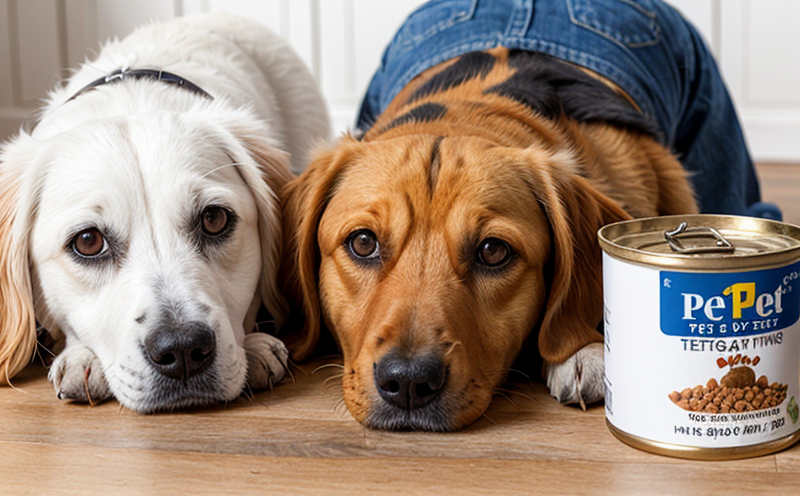ISO 114901 E. coli Testing in Pet Nutrition
The ISO 114901 standard provides a robust framework for ensuring the safety and quality of pet food by assessing the presence and levels of Escherichia coli (E. coli). This testing is crucial as it helps identify potential health risks to pets, particularly those with compromised immune systems. The standard focuses on both pathogenic and non-pathogenic strains of E. coli, which can significantly impact pet nutrition and safety.
The methodology involves various steps designed to ensure accurate results. Sample preparation includes thorough homogenization of the pet food sample followed by appropriate dilution to achieve a concentration suitable for quantitative analysis using a selective medium. The selected medium is specifically designed to enhance the growth of E. coli while suppressing other microorganisms.
The testing process typically involves inoculating the prepared samples onto the selective medium and incubating them under controlled conditions. After an appropriate incubation period, colonies are counted manually or semi-automatically using a colony counter. The number of colonies is then compared against established thresholds to determine compliance with safety standards.
For accurate results, it's essential to follow strict procedural guidelines outlined in ISO 114901. These include precise sample handling techniques, controlled incubation conditions, and standardized reagents. Compliance officers should ensure that all personnel involved are trained according to these protocols. Additionally, quality managers must verify the accuracy of analytical equipment through regular calibration checks.
The importance of this testing cannot be overstated. Non-compliance could lead to health hazards for pets consuming contaminated food products. Therefore, rigorous adherence to ISO 114901 ensures pet safety and builds consumer trust in product quality.
| Sample Type | Testing Method | Incubation Conditions | Expected Outcome |
|---|---|---|---|
| Pet Food Samples | Selective Medium Inoculation | 35°C for 24 hours | Count of E. coli colonies |
Scope and Methodology
The scope of ISO 114901 E. coli testing in pet nutrition encompasses several key areas aimed at ensuring the safety and quality of pet food products. This includes assessing the presence and levels of pathogenic and non-pathogenic strains of E. coli within these products.
- Sample Preparation: Thorough homogenization followed by dilution to achieve optimal concentration for quantitative analysis.
- Selective Medium Inoculation: Use of a medium designed to enhance the growth of E. coli while suppressing other microorganisms.
- Incubation Conditions: Controlled incubation at 35°C for 24 hours to facilitate colony formation.
- Manual or semi-automated counting of colonies on the selective medium.
- Comparison against established thresholds to determine compliance with safety standards.
Industry Applications
The application of ISO 114901 E. coli testing in pet nutrition is extensive, covering various stages from raw material procurement to final product release. This ensures that every step in the production process adheres to stringent safety standards.
- Raw Material Inspection: Ensuring incoming materials are free from harmful contaminants.
- Packaging Integrity Testing: Verifying that packaging maintains product integrity during transit and storage.
- Final Product Release: Confirming the final product meets all safety and quality criteria before market release.
A table illustrating different scenarios where this testing is applicable:
| Stage | Testing Focus | Expected Outcome |
|---|---|---|
| Raw Material Inspection | Contaminant Detection | Free from harmful E. coli strains |
| Packaging Integrity Testing | Product Protection | Uncompromised during transit and storage |
| Final Product Release | Safety Compliance | Meets all safety standards for pets |
Customer Impact and Satisfaction
The implementation of ISO 114901 E. coli testing in pet nutrition directly impacts customer satisfaction by ensuring the safety and quality of pet food products. Pets consuming these products are at reduced risk from potential health hazards, thereby enhancing overall well-being.
- Increased Consumer Confidence: Ensures pets can consume safe food products without fear of contamination.
- Enhanced Brand Reputation: Demonstrates a commitment to quality and safety, which builds trust among consumers.
- Better Product Performance: Ensures that all stages of production meet the highest standards, leading to consistent product performance.
A satisfied customer base translates into long-term loyalty and positive reviews, which are vital for maintaining a strong market presence. Compliance officers play a crucial role in overseeing these processes, ensuring that every aspect aligns with international standards like ISO 114901.





